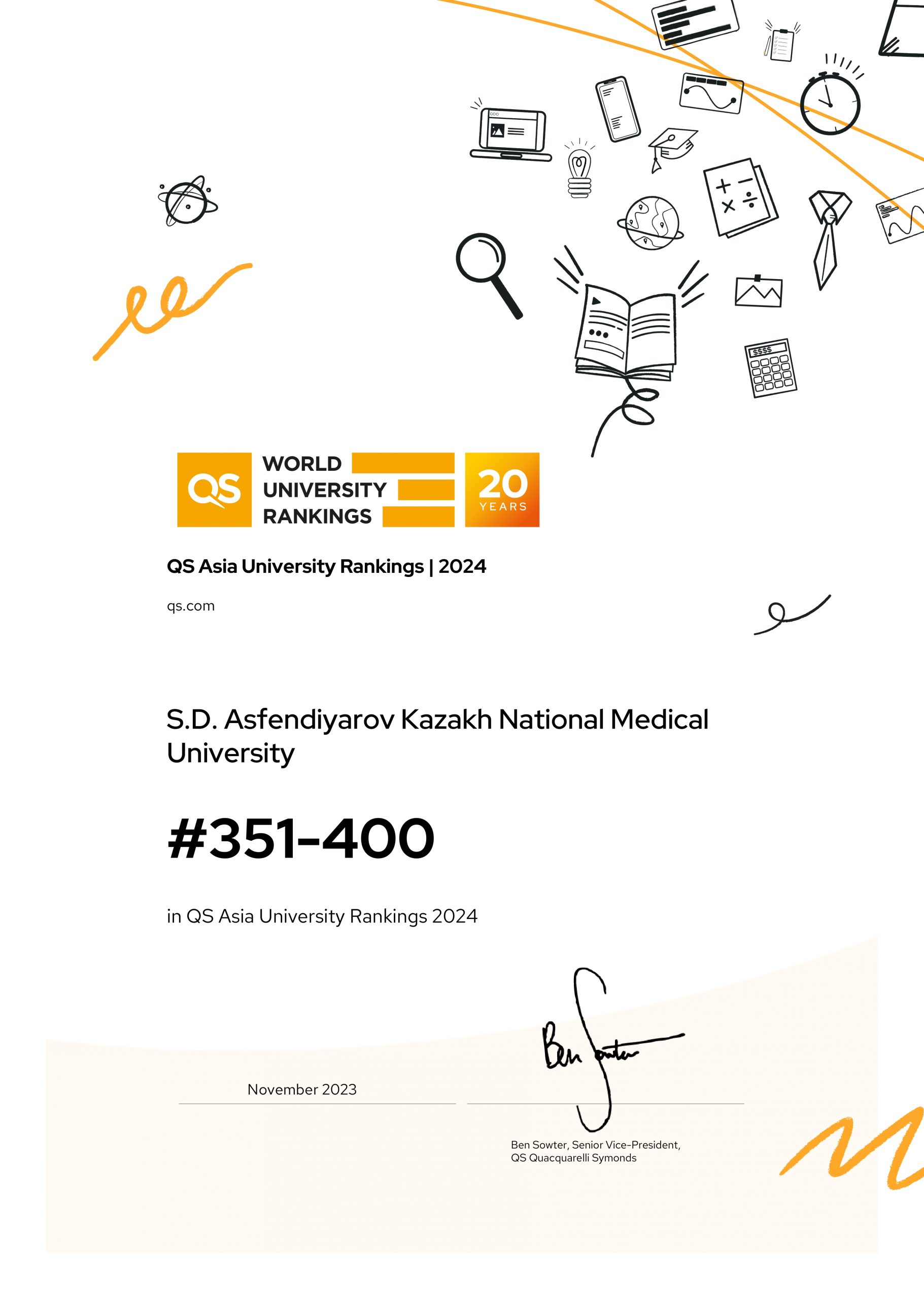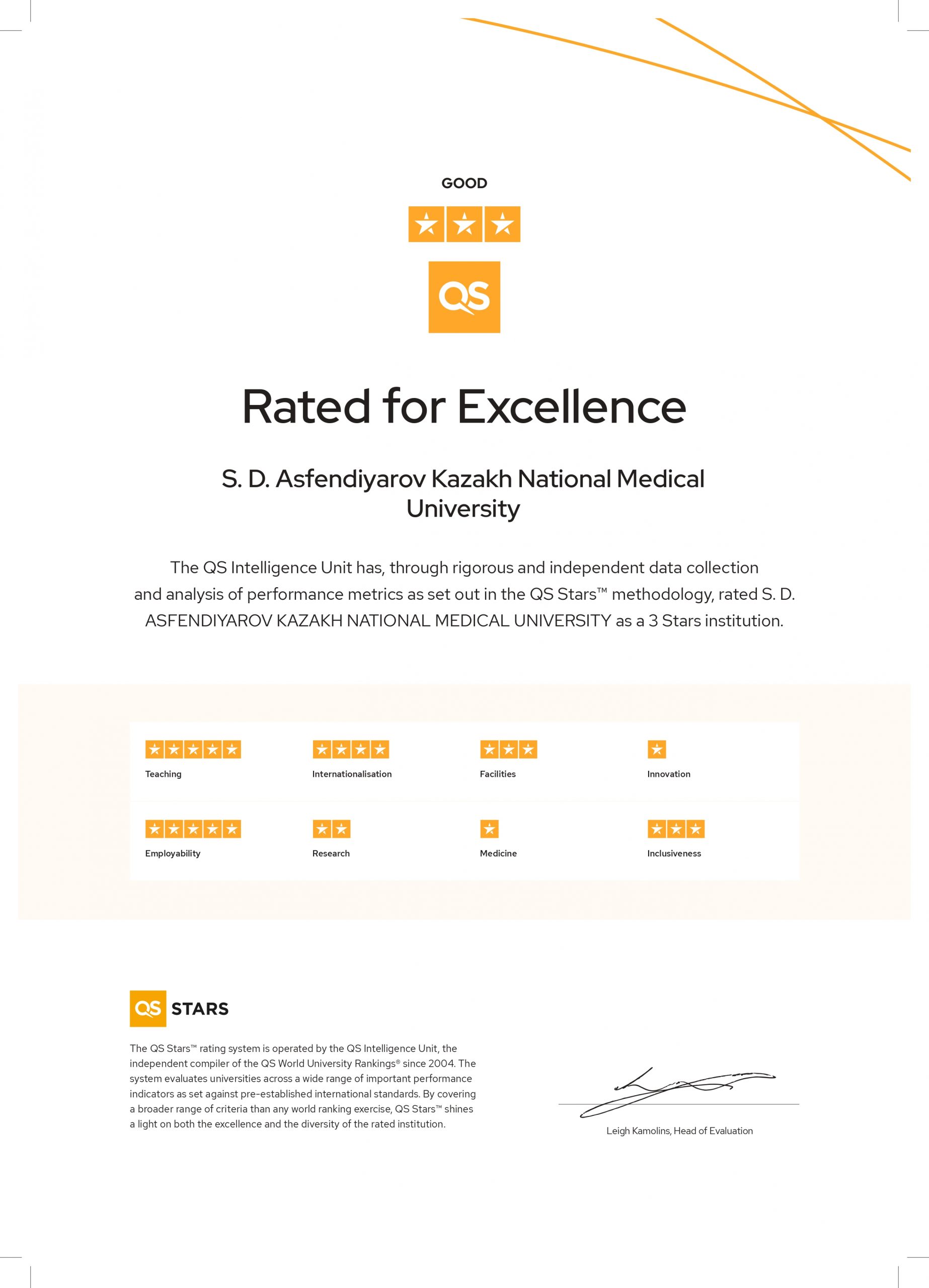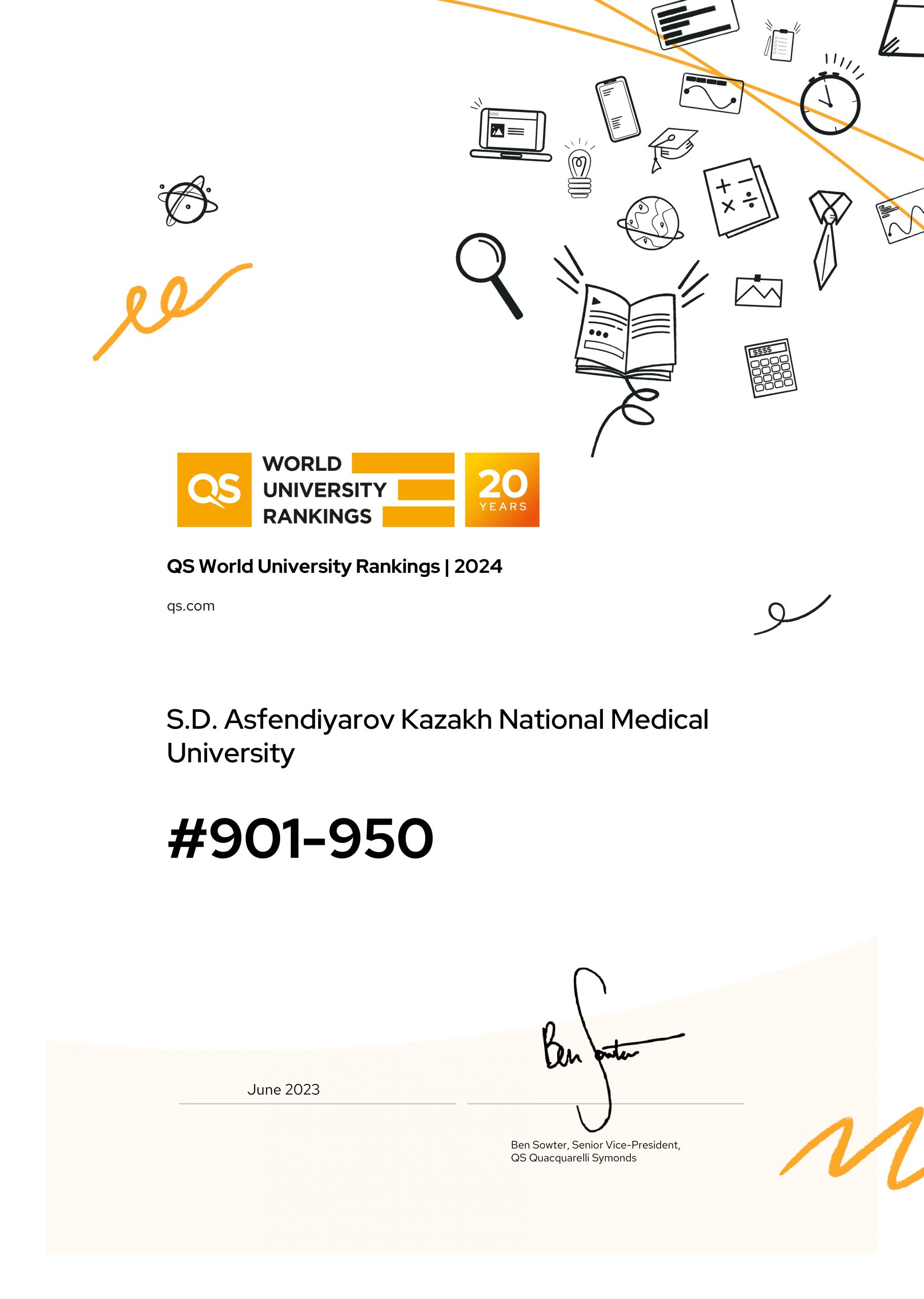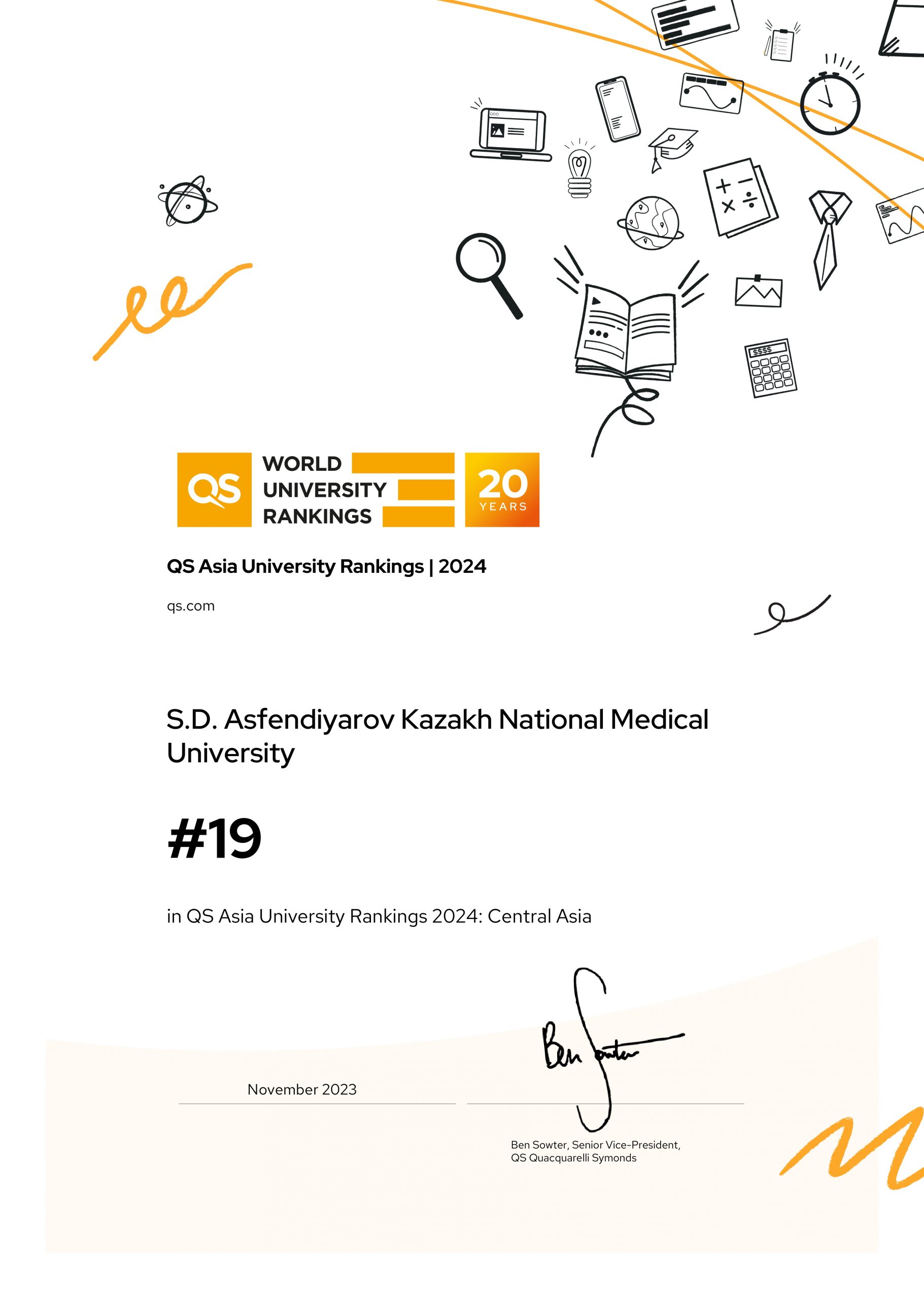Doctoral-program
Code: 8D10101
Faculty: Faculty of postgraduate education
Mission– An integrated approach to training a highly qualified competitive specialist in the field of public health, capable of continuous professional development based on the integration of education, science and practice, to formulate, solve modern scientific and practical problems and successfully carry out research, teaching and management activities.
Purpose-Preparing personnel for the practical healthcare and research sector, capable of effectively solving public health problems, being a leader in science, practice and meeting the challenges of the ХХI st century.
ON1 Use multidisciplinary standards for public health research at international and national levels.
ON2 Develop and implement systems for monitoring activities to assess the quality of scientific publications, critical analysis using statistical software in the field of public health.
ON3 Develop public health strategies, including risk management programs, based on hypotheses on maintaining and improving public health.
ON4 Demonstrate diplomacy, apply leadership skills to work effectively in interprofessional teams in the field of their qualifications using modern scientific approaches in the field of public health.
ON5 Conduct organizational, managerial and financial analysis to predict the impact of introducing new services, measures to improve health policy to meet the challenges of public health.
ON6 Design, implement, manage and evaluate a health promotion strategy using international public health standards.
ON7 Define ethical principles and aspects of public health, authorship, publications in the scientific context of literature, observance of intellectual property rights.
ON8 Apply knowledge and skills in research and teaching activities in the professional field.
| Basic disciplines |
| The university component |
| Introduction to PhD research
number of credits – 4 type of control – exam Key components, stages, classification and design of scientific research. Modern requirements. Fundamentals of planning, organizing and conducting research in accordance with the principles of evidence and ethics of research. Research Methods. Drawing up a research program. |
| Partnership: research and society
number of credits – 5 type of control – exam Theoretical provisions expressing the essence and content of partnership, research and society, technology for its support; the main stages of the formation and development of social partnership, research and society as a consensus type of social interaction; the importance of the main categories of social partnership, research and society. |
| Reading skills and critical analysis of scientific
number of credits – 4 type of control – d/c Assessment algorithm for scientific publication. Methodological requirements for high-quality clinical research. A critical analysis of research methods. Discussion of the results of the study. Criteria for evaluating the effectiveness of interventions. Clinical relevance and statistical significance. |
| Project management
number of credits – 4 type of control – exam Basic concepts of project management. Organizational design and project management. Essence, functions, design and management methods. Project life cycle. Design analysis. Assessment of the effectiveness of the project. Types of plans. Project Manager Functions. Project management structure. Regulation of project implementation, change and risk management. Quality assurance in project management. Psychological foundations of project management. Creating a project team. |
| Introduction to teaching and oral communication
number of credits – 5 type of control – exam The discipline studies the issues of teaching, learning and oral communication. Directly related to the vocational training of students – the teaching of public education disciplines in higher educational institutions and the direction of theoretical and practical mastering of the peculiarities of education, teaching, studying the subjects of vocational education, communication skills and interpersonal communication of the teacher. |
| Applied statistics
number of credits – 4 type of control – exam The purpose of multivariate data analysis methods. Multiple linear regression. Key assumptions. The main effect and interaction. Choosing the best model. Diagnostics of the model. Logistic regression. Key assumptions. Choosing the best model. Diagnostics of the model. Presentation of regression results in scientific publications. |
| Methodology of qualitative types of research
number of credits – 4 type of control – exam Knowledge, understanding and skills in qualitative research methods used to study public health problems. Theoretical foundations of qualitative research, factors affecting the usefulness of a qualitative approach, and ethical considerations in qualitative research. Basic concepts and methods used in quality research; basic principles for assessing the quality of research; concepts of validity, reliability and generalization. |
| Component of Choice |
| Health management and leadership
number of credits – 5 type of control – exam Management and leadership in the healthcare system should be established as two independent concepts. Although they are united and connected, leadership and direction are necessary to implement and achieve set goals. Currently, it is planned that equally broad capabilities of leaders and managers should be developed to ensure the effectiveness of the medical organization. |
| International standards for the quality of scientific research
number of credits – 5 type of control – exam Formation of a system of basic knowledge and skills for the organization and conduct of scientific research in accordance with international standards for the quality of scientific research. Utilization of research practices: GCP, GLP, GMP standards, and international requirements for the quality of scientific publications. |
| Professional skills of a researcher
number of credits – 4 type of control – exam The model of personality research competencies serves as the basis for the quality management of research activities in public health. The education approach focuses on developing competencies to solve significant problems, utilizing the researcher’s own experiences within the societal context. |
| Evaluation of the effectiveness of the functioning of public health services
number of credits – 4 type of control – exam Indicators of the effectiveness of the healthcare system serve as a criterion for social and economic significance in state development. Effectiveness is expressed by the impact on maintaining and enhancing population health, increasing labor productivity, reducing healthcare and social insurance costs, and promoting national income growth. |
| Unified health
number of credits – 4 type of control – exam Unified health is a comprehensive discipline that combines approaches to achieve an optimal level of human, animal, and ecosystem health, ensuring a sustainable balance among these components based on their close interdependence. |
| Scientific Information management
number of credits – 4 type of control – exam This discipline focuses on applying leadership, organization, development, and creation skills for effective use of tools and methods in scientific research. The manager’s role is crucial, involving planning research progress and analyzing and forecasting results. |
| Pedagogical Practice
number of credits – 3 type of control – d/c The content of pedagogical practice includes elements of pedagogical activity necessary for implementing the educational process. This encompasses teaching academic disciplines, organizing students’ educational activities, conducting scientific and methodological work, utilizing interactive teaching methods, and incorporating information pedagogical technologies, all tailored to the profile of doctoral students. |
| Research Practice
number of credits – 3 type of control – d/c This practice involves assessing phenomena and processes in public health, identifying cause-and-effect relationships, and conducting analytical and observational studies. It also covers scientific writing, including the conceptual framework, various types, principles, and requirements for scientific publications, as well as evidence-based public health research and priority setting for developing research programs. |
| Doctoral Student Research Work, Including Internship and Doctoral Dissertation
number of credits – 123 type of control – d/c This component focuses on the analysis and mastery of research methods, identification of current public health issues, and evaluation of research results, culminating in the doctoral dissertation. |
Code: 8D10105
Faculty: Faculty of postgraduate education
Mission: Training of highly qualified specialists with a high level of professional competence, ready to carry out professional activities in the field of biomedicine, capable of applying and developing advanced innovative technologies in science, education, and professional practice.
Purpose: Training of qualified specialists with a high level of professional competence, ready to carry out professional activities in the field of biomedicine, capable of applying and developing advanced innovative technologies in science, education and professional activities.
ON1 Analyzes the fundamental principles of biological system functioning and synthesizes advanced technological and methodological approaches to research in order to solve problems related to human health improvement.
ON2Evaluates the compliance of scientific and research practices with international ethical and scientific quality standards at all stages, including project design, grant application preparation, execution, documentation, reporting, and publication of results.
ON3 Applies the principles and standards of good laboratory practice to conduct routine and advanced (within specialization) biomedical research.
ON4 Demonstrates professional and personal leadership, makes responsible decisions, and initiates actions aimed at achieving the best outcomes in professional and social activities.
ON5 Organizes and implements a high-quality educational and training process using appropriate methodological approaches and strategies based on educational standards and best teaching practices.
ON6 Communicates effectively in various professional and interpersonal contexts, utilizes professional terminology, and adapts information across different communication channels.
ON7 Develops a personal growth plan, applies leadership concepts, modern approaches to healthcare management, manages change and stress within an organization, ensures effective team communication, and engages in lifelong learning to expand professional competencies.
| Basic disciplines |
| The university component |
| Academic writing
number of credits – 5 type of control-exam The discipline aims to develop research skills and the ability to write scientific texts (articles, theses, dissertations),It focuses on fostering written and oral scientific argumentation, as well as critical analysis of scientific publications. Special attention is given to mastering the structure of scientific papers and adhering to academic standards in their preparation and formatting. |
| Biostatistics (advanced course)
number of credits – 5 type of control-exam |
| Methods of scientific research
number of credits – 5 type of control-exam The discipline provides for development of knowledge and skills of independent planning, implementation and evaluation of results of scientific research. Legal and ethical regulation of scientific research is studied; methodology of descriptive, analytical, experimental and qualitative research. Analysis of the main errors of scientific research is conducted. |
| Experimental models in biomedicine
number of credits – 6 type of control-exam The discipline studies issues of experimental biomodeling (basic concepts, methodology for constructing biomedical research, choice of biomodel). Issues of standardization of laboratory animals, biomodeling will be considered, documentation necessary for conducting experiments will be presented, as well as approaches and methods for modeling various pathological conditions, reproducible biological models on various types of experimental animals. |
| Component of Choice |
| Medical biotechnology
number of credits – 5 type of control-exam The discipline will allow you to become familiar with the possibilities of recombinant methods for obtaining natural compounds that are promising for use in medicine, the development of methods for using biotechnological products in scientific research and medical practice (gene editing systems – CRISPR-CAS, ZNF, TALEN,the latest methods of regenerative medicine – bioprinting, the use of stem cells, cell therapy, the use of mono-poly-nanoclonal antibodies, etc.). |
| Medical biotechnology with fundamentals of personalized medicine
number of credits – 10 type of control-exam The discipline is aimed at studying modern advances in medical biotechnology and the fundamentals of personalized medicine. Special attention is given to molecular genetic diagnostic methods, mechanisms of action of targeted drugs, strategies for personalized therapy selection, and patient data analysis to improve the effectiveness and safety of medical interventions. |
| Proper laboratory practice (GLP) and bioethics
number of credits – 5 type of control-exam The discipline will allow you to become familiar with the basic rules and principles of the GLP standard, requirements for premises, equipment, researchers and managers, safety rules in research laboratories, become familiar with the ethical aspects of biomedical research, master the skills of drawing up a research protocol that meets the basic requirements, and submitting an application to the ethics commission. |
| Biomedical research «in silico»
number of credits – 8 type of control-exam The discipline will provide an introduction to computational models and simulations used in biomedical research to predict and identify the dynamics of biological systems, their design and control in the evaluation of medical products. The discipline will allow you to master the methodology of using computer programs (models) to conduct simulation experiments, analyze and interpret the results obtained. |
| Laboratory research methods in biomedicine
number of credits – 8 type of control-exam The discipline will allow you to master the methodology for setting up and application points for solving research problems of in vitro biomedical research methods (PCR, GWAS, flow cytometry, immunoassay methods, etc.). Screening studies and confirmatory tests for accumulation or absence of metabolites will be studied, as well as the correlation of laboratory results with clinical symptoms of model diseases. |
| Pedagogical practice
number of credits – 3 type of control-d/c Demonstrates systemic knowledge and understanding of the pedagogical process, the methodology of pedagogical activity in medicine within the chosen area of training in the specialty, models and predicts the pedagogical process, solves standard pedagogical tasks, works with audiences, independently performs professional functions and objectively evaluates oneself and the results of one’s work. |
| Research practice
number of credits – 3 type of control-d/c Conducts a comprehensive research process using knowledge of basic biomedical sciences to solve specific research problems in biomedicine. |
| Doctoral student research work, including internship and doctoral dissertation
Number of credits – 123 Type of control- d/c Plan, develop, implement and adjust a comprehensive scientific research process; Contribute with original research to advance the boundaries of a scientific field that is worthy of publication at the national or international level. Use methods of quantitative and qualitative analysis in scientific research. Knowledge of at least one foreign language at the level of fluency in medical and scientific information. |





